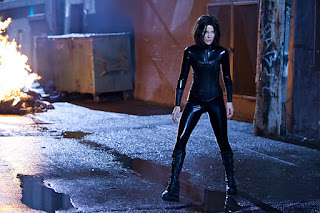MOST VISUALLY AMBITIOUS CINEMATIC EXPERIENCE IN “X-MEN: APOCALYPSE”
Press release
Set a decade after the events of “X-Men: Days of Future Past,” the latest “X-Men: Apocalypse (see my review here)” finds the mutants in 1983 living their own lives. Charles Xavier (James McAvoy) has his school for gifted youngsters up and running, and has some promising new students he’s guiding as they figure out their lives. Erik “Magneto” Lensherr (Michael Fassbender) is living a quiet family life in Poland, while Raven (Jennifer Lawrence) is eschewing her mutant side, worried that humanity still doesn’t completely accept them. Their world is thrown into chaos when an incredibly powerful, ancient mutant named Apocalypse (Oscar Isaac) awakens and decides that the world has taken a turn for the worse and decides to destroy civilization and create it again in his own image.
 |
| Photo credit: 20th Century Fox |
Bryan Singer brings the X-men in an epic showdown with their most powerful unstoppable enemy.
Given Apocalypse’s vision of global destruction, it’s no surprise that this is the most visually ambitious of X-Men pictures. “We’re not only traveling the world, we’re talking about the potential end of the world, and perhaps the end of the universe,” says director of photography Newton Thomas Sigel, who previously collaborated with Singer on DOFP, X2, and X-MEN, among other films. Adds Oscar Isaac, who plays the seminal figure: “The stage is set for an epic mutant versus mega-mutant war. The battle between the X-Men and Apocalypse is insane!”
Apocalypse’s 5,000-year slumber began when civilization was at its peak; his sleep ends when it’s arguably at its nadir. Having grown up in eighties, producer Simon Kinberg understood how it was marked by excess, as seen in the hair styles, fashion, and automobiles. “In 1983, Apocalypse rises from the perfection of ancient Egyptian culture into an over-populated, polluted, nuclear-threatened culture,” he says. “So his motivation is understandable, though his methods and goals are extreme.”
Oscar Isaac, who took on the role of Apocalypse following his star turn as the heroic pilot Poe Dameron in “Star Wars: The Force Awakens” and the avant-garde artificial intelligence creator in “Deus Ex Machina” calls the character nothing less than “the creative/destructive force of this earth. When things seem like they’re no longer evolving—like they did in the 1980s—he destroys those civilizations.”
The character’s makeup effects included a forehead piece, a nose and cheek piece, a jaw and chin piece, a headpiece, a neck piece and even a helmet. “The only body part that wasn’t covered was Isaac’s eyeballs,” jokes specialty makeup designer Brian Sipe. “With a head dress and neck piece, as well as a twenty piece costume, the entire process was “like a giant jigsaw puzzle,” he adds. One of the prominent features in the Apocalypse design is the metallic-looking “dreads.” The challenge was making the suit “look heroic on a normal man’s body while allowing the actor to maintain mobility and conform,” says Sipe. They also had to keep Isaac cool in hot and humid Montreal summer weather. “We used a system called Cool Shirt,” Sipe continues. “It’s a cooling system similar to what race car drivers use; Oscar was plugged into ice water whenever he wasn’t filming to maintain a comfortable temperature.”


Comments
Post a Comment